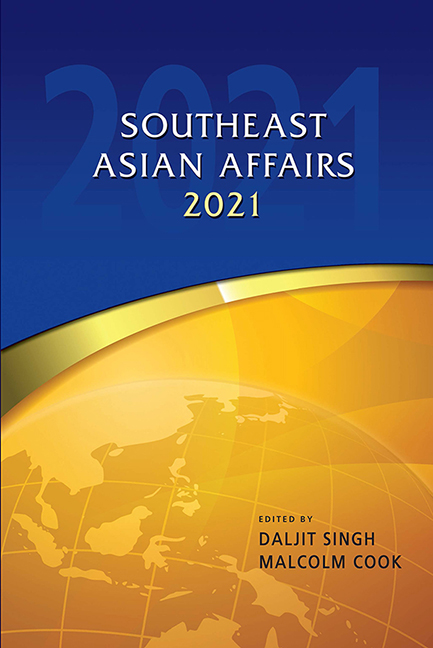Cambodia in 2020: Regime Legitimacy Tested
Published online by Cambridge University Press: 09 October 2021
Summary
The year 2020 has been one of survival for millions of Cambodians, especially the poor and the vulnerable, with their livelihoods affected by the COVID-19 pandemic, flash floods and economic sanctions by the European Union and United States. The ruling regime's legitimacy—chiefly measured in terms of economic performance, public service delivery and infrastructure development—is facing pressing challenges as the economy suffers its worst contraction since the establishment of the Second Kingdom in 1993. State capacity, political leadership and social resilience have all been under severe strain. In June the government decided to cut half of its budget in 2021, but it reversed its decision in October and instead reduced the budget by only about seven per cent. The budget for 2021 is about US$7.6 billion, compared with US$8.2 billion in 2020. Moreover, these unprecedented downward socio-economic pressures affect the development trajectory of the Kingdom, including efforts to realize the United Nations Sustainable Development Goals (SDGs) by 2030 and the visions to become a higher-middle-income country by 2030 and a high-income country by 2050.
After the controversial landslide victory in the general election in 2018, the government, led solely by the Cambodian People's Party (CPP), pledged to carry out “serious” reforms under the slogan of “taking a bath, looking in the mirror, cleaning the body, applying treatment, and conducting surgery”. The appointment in 2020 of new, young and dynamic cabinet members to head the Ministry of Justice, Ministry of Posts and Telecommunications and Ministry of Civil Service was applauded, but the results of these reforms are being awaited. Since 2018 the government has made strides in state revenue collection and the capacity of the state to deal with pandemics like COVID-19 and natural disasters. Widespread and systemic corruption, however, remains the most complex public sector issue in need of reform.
It can be argued that Cambodia responded relatively well to the COVID-19 pandemic and the flash floods. With respect to the external economic and diplomatic pressures highlighted by the imposition of sanctions, the government has adopted and promoted a hedging strategy through economic diversification. The government was able to maintain a reasonable degree of public trust. But as the sources of regime legitimacy and the political power bases are becoming more volatile, the government must continuously improve its performance to address legitimacy deficits.
- Type
- Chapter
- Information
- Southeast Asian Affairs 2021 , pp. 73 - 91Publisher: ISEAS–Yusof Ishak InstitutePrint publication year: 2021

